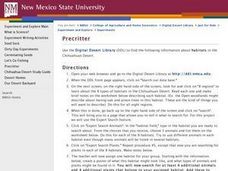Curated OER
Habitats
In this habitats learning exercise, 3rd graders cut out the 14 habitat descriptions and place them under the correct habitat...
Curated OER
Whose Home Is This?
After reading a short and informative paragraph on animals and their environments, learners look at pictures of four animals, and write a short description of how each one has adapted to its environment. A suggested activity is that each...
Curated OER
Where Do They Live?
In this animal habitat worksheet, students color a picture of 3 habitats. They then cut and color 12 animal pictures. Students paste the animals in the spaces, according to where they live.
Curated OER
Using Math To Make Decisions About Animal Habitat
In this animal habitat instructional activity, students read, analyze and solve 5 scenarios involving mathematics and animal habitats. Students work out each decision they decide as correct and write out a proposal for each one.
Curated OER
Outside Animals Crossword Puzzle
In this outside animals worksheet, students explore all the possible animals that live outside in the wilderness and their habitats and then find the answers to fifty questions associated with those animals in a crossword puzzle.
Curated OER
Research: Habitats in the Chihuahuan Desert
In this desert habitat worksheet, students follow the links to research information about the Chihuahua desert. Students fill out the graphic organizer with facts about the habitat, animals and plants of this region.
Curated OER
Habitats Activity
In this habitat worksheet, students identify and sort the animals in a box of animal crackers to the habitats to which they belong and then create a graph to document how many animals fit into each habitat.
Curated OER
Animal Habitats
In this habitat worksheet, 3rd graders will focus on the four different habitats of plants and animals. Students will receive color photographs of the rainforest, desert, coral reef, and grasslands.
Curated OER
Survival of the Spiniest
In this earth science worksheet, students identify and discover the amazing ways that desert plants adapt to harsh habitats. They use discussion and drawing to explore their existing knowledge about deserts. Then, students respond to 15...
Curated OER
3rd grade life science
In this life science learning exercise, 3rd graders answer multiple choice questions about plants, birds, habitats, and more. Students complete 20 questions.
Curated OER
Animal Habitat Bar Graph
In this graphing worksheet, students examine a prepared bar graph and record which habitat their chosen animal lives in: desert, city, forest, ocean, prairie, or fresh water. There are no directions but it appears that a class could use...
Curated OER
Biome Detective Sheet
In this biomes activity, students research the plant and animal life found in different habitats. This activity has 38 short answer questions.
Curated OER
Turtle Fun Facts
In this turtles worksheet, students read two pages of facts about turtles. Students match four kinds of turtle pictures to their habitats.
Curated OER
For Creative Minds: Mountain Ecosystems
In this mountain ecosystems worksheet, students read information about mountain ecosystems and study various diagrams about the environment. Students match animals in the ecosystem to their descriptions.
Curated OER
The right place to live
How do various plants survive in different environments? They adapt! Kids determine which plant traits make them perfect for their specific environment. They consider three plants and can even complete a plant experiment. Note: Intended...
Curated OER
Your Favorite Wild Animal
In this research skills worksheet, students select a wild animal and then respond to 5 short answer questions regarding it. In addition, students draw a picture of it and define 6 habitat terms.
Curated OER
It's A Zoo!
In this noun and article worksheet, students review and identify nouns and articles in sentences. In this underline and short answer worksheet, students answer eleven questions.
Curated OER
The Great Horned Owl
In this recognizing facts about the Great Horned Owl worksheet, students read fun facts, match illustrations with adaptations, sequence life cycle cards, and read what to do if they find an injured bird. Students solve 16 answers.



















